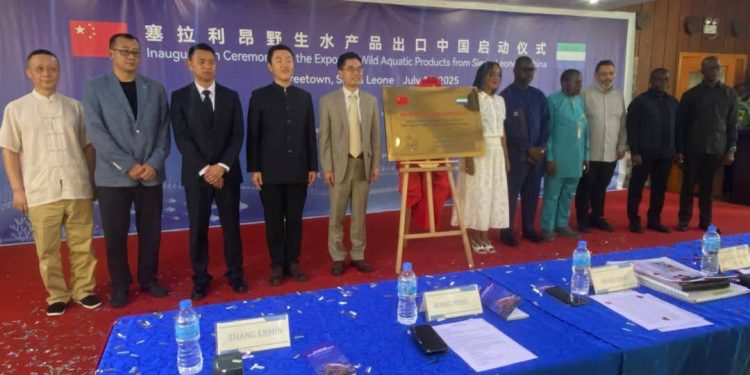By Hassan Osman Kargbo
Sierra Leone has officially commenced the export of its wild aquatic products to China, marking a historic milestone in the country’s fisheries industry and deepening bilateral trade relations between Sierra Leone and the People’s Republic of China.
The launch was facilitated by OK Global Fisheries Company, a leading Chinese fisheries enterprise, and was hailed as a transformative moment for Sierra Leone’s fishing sector. The event follows the China-Africa Cooperation Forum held in Beijing in September 2024, which laid the groundwork for expanding trade partnerships between the two nations.
In her keynote address, the Minister of Fisheries and Marine Resources, Madam Princess Dugba, described the launch as a “landmark in Sierra Leone-China cooperation,” highlighting the strategic value of the fish export certification agreement.
She noted that the partnership would open direct access to Chinese markets for Sierra Leonean fishing businesses, allowing them to gain greater control over pricing and market strategies.
“This development signifies a new era in Sierra Leone’s fish trade,” said Minister Dugba. “The zero-tariff policy that came into effect on December 1 will significantly boost profitability for local fishing companies and increase national export revenues.”
She encouraged both industrial and artisanal fishing entrepreneurs to seize the opportunity, emphasizing the potential for long-term growth, sustainable development, and improved livelihoods.
Chinese Ambassador to Sierra Leone, Wang Quing, also spoke at the event, describing the inauguration as a major achievement in the evolving relationship between the two countries.
“This doesn’t only mark a new stage in our fisheries cooperation but also stands as a symbol of the dynamic partnership and profound friendship between our people,” Ambassador Wang said.
He acknowledged the complexities of the approval process—including documentation, technical reviews, risk assessments, quarantine protocols, and company registration—but praised the joint efforts that led to the project’s rapid success in under a year. He credited Chinese President Xi Jinping’s leadership and strategic guidance, as well as the collaborative work of Sierra Leonean institutions and the private sector.
Ambassador Wang highlighted three key points: the mutual benefit of the cooperation, the richness of Sierra Leone’s fisheries resources—valued at $240 million annually and supporting over 200,000 jobs—and the sector’s significance as one of Sierra Leone’s traditional pillar industries.
He added that the certification enables Sierra Leone to diversify and expand its export footprint in China, bringing practical and strategic advantages to both nations.
In a related development, Ambassador Wang announced that construction preparations for the Black Johnson Fish Harbour have officially begun. Funded by the Chinese government, the project is considered a cornerstone of China’s development assistance to Sierra Leone. A team of Chinese contractors arrived in the country last week to initiate early-stage work.
“This project will enhance Sierra Leone’s entire fisheries value chain—from production to processing and logistics—improving the competitiveness of our aquatic products in international markets,” he said. “It will also stimulate local employment and development, particularly in surrounding communities.”
The Deputy Speaker of Sierra Leone’s Parliament, Hon. Ibrahim Tawa Conteh, also addressed the gathering, applauding the years of work that led to the fish export certification. He emphasized that for the past seven years, the government had worked tirelessly to bring Sierra Leone’s fisheries products up to international quality standards.
“This event is another key milestone, one rooted in the bilateral protocol on inspection, quarantine, and sanitary requirements signed with the Chinese government,” said Hon. Conteh. “It represents a high level of cooperation and state integration, and it proves our ability to meet global standards.”
He underscored the importance of adopting an innovative fisheries management approach that transcends traditional policy boundaries. According to him, sustainable fishing practices, regulatory enforcement, and government oversight must work hand in hand to support a productive and well-managed fishery.
“Our sector needs policies that link fisheries to broader economic activities,” he concluded. “Only then can we fully realize the potential of our ocean resources for national development.”
With this breakthrough, Sierra Leone positions itself as a key exporter of high-quality seafood to China, opening doors to increased trade, economic diversification, and stronger international partnerships.










